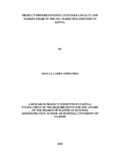| dc.contributor.author | Aballa, Larry; O | |
| dc.date.accessioned | 2019-01-14T07:03:21Z | |
| dc.date.available | 2019-01-14T07:03:21Z | |
| dc.date.issued | 2018 | |
| dc.identifier.uri | http://hdl.handle.net/11295/104560 | |
| dc.description.abstract | This study sought to establish the extent to which adoption of product differentiation strategies affect customer loyalty and market share of the oil marketing firms in Kenya. The study utilised a descriptive cross-sectional survey design and the target population comprised of thirty five (35) OMCs in Kenya registered by the Energy Regulatory Commission as at 2017. Primary data was collected using semi-structured questionnaires that were administered to the respondents. Four hundred and eighty three (483) motorists out of the targeted 500 responded translating to a high response rate. Secondary data was retrieved from the statistics of market share of the OMCs between 2015 and 2017. Secondary data was also obtained from the company websites of the OMCs regarding the level of product differentiation adoption rates. Descriptive statistics was used in analysing the data and the results were presented in tables and charts. The study found that the adoption rate of differentiation strategies was very low with only a small percentage of OMCs having a high adoption rate. The most applied strategy was quality while the least applied by the firms was pricing. Product differentiation was found out to have a strong positive correlation to customer loyalty and market share, with customer loyalty showing a greater correlation to market share than product differentiation. The findings also indicated that customer satisfaction has a very strong positive correlation to customer loyalty as customer satisfaction explained a very big percentage of customer loyalty. Pricing and purchase experience strategies had negative correlation to satisfaction while unique hidden features showed the greatest potential of all the differentiation strategies. This is because the OMCs that adopted the strategy also achieved the highest satisfaction score among the respondents, with Total Kenya Limited achieving the highest score. It is therefore recommended that firms should seek to continually differentiate their products from those of competition. This is due to the fact that a new strategy is soon copied by competitors, hence becoming a norm. OMCs are further advised to diversify its operations to include other services which are customer oriented to boost customer experience. The firms are also advised to invest heavily on advertising to sensitize the public, hence improving competitiveness, customer loyalty, market penetration and ultimately profitability. Future studies could aim at determining the effect of other differentiation strategies on market share in other industries. | en_US |
| dc.language.iso | en | en_US |
| dc.publisher | University of Nairobi | en_US |
| dc.rights | Attribution-NonCommercial-NoDerivs 3.0 United States | * |
| dc.rights.uri | http://creativecommons.org/licenses/by-nc-nd/3.0/us/ | * |
| dc.subject | Product Differentiation, Customer Loyalty and Market Share in the Oil Marketing Industry in Kenya | en_US |
| dc.title | Product Differentiation, Customer Loyalty and Market Share in the Oil Marketing Industry in Kenya | en_US |
| dc.type | Thesis | en_US |



